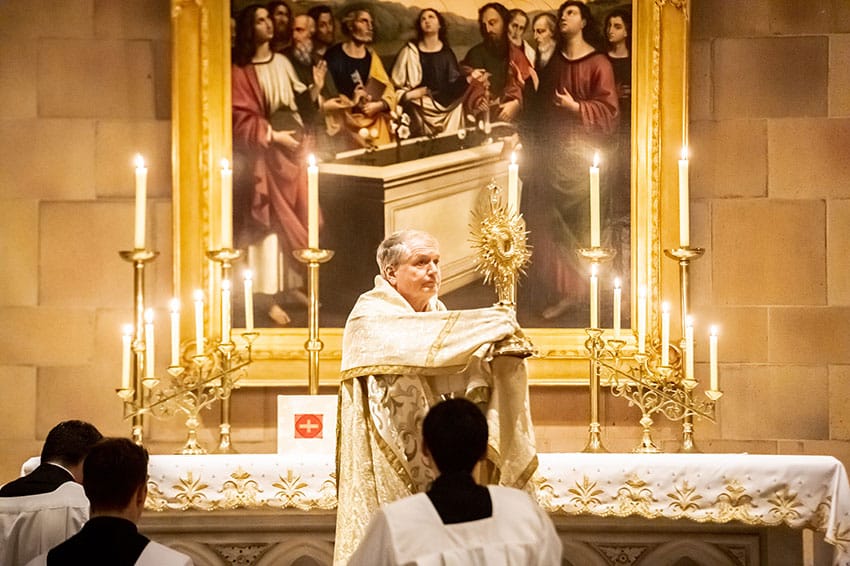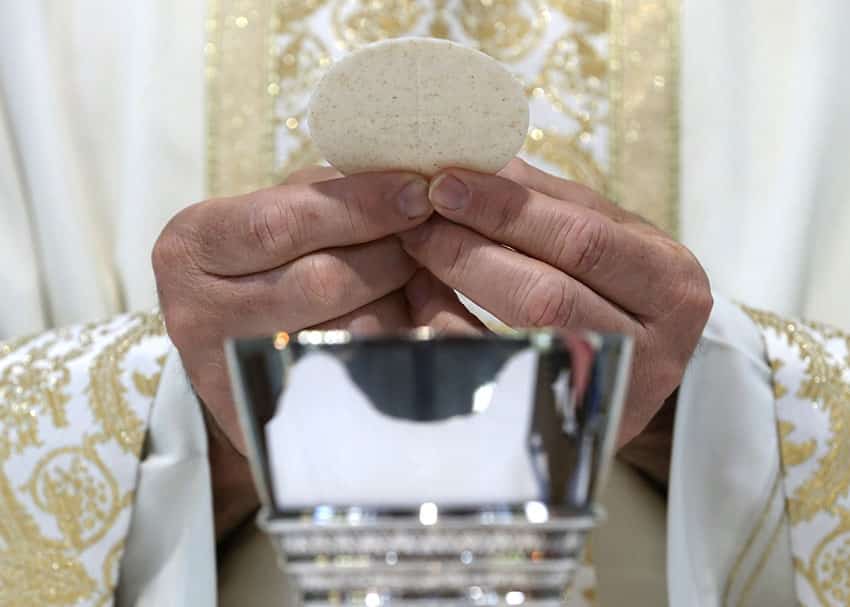
Homily for the Solemn Mass for the Most Holy Body and Blood of Christ, St Mary’s Cathedral, Sydney, 11 June 2023.
Therapists and life-coaches describe it as the antidote to our fast-paced and distracted lives, and a remedy for many physical and psychological ailments. Self-help guru Tony Robbins says it’s the best thing we can do for ourselves and others. And Forbes magazine, the entrepreneurs’ bible, says it’s the most effective. What is this magic bullet? Being present in the moment.
Sounds easy: after all, we are always somewhere and often with someone. The COVID years helped us appreciate that, while the new media are great for information gathering, messaging, even some meetings, virtual presence is second best to real person-to-person presence. But in a culture of reduced attention-spans and constant multi-tasking, fear-of-missing-out and addiction to devices, of bombardment by information and opinion, industrial-commercial sights and social media sounds, of ever-growing workplace demands and home worries, it’s hard to be as present to what’s in front of us as we might like.
We can get so lost in the busyness and distractions that we either manically grasshopper from thing to thing or drift off and function on autopilot. Even when dining or watching a movie with those we love, we can end up scrolling on our smart-phone or letting our minds wander. Being present requires more than just being there: we must attend to the place, people and concerns, gratefully appreciating each moment as a gift.
One of the features of God in the Old Testament—that set him apart from the rival deities of surrounding cultures—was precisely how present he was. He was no “set and forget” kind of God, but much more “hands on.” He fashioned humanity from clay in his own image, with his own hands and breath, and he walked and talked with them in a paradisal garden. Even after the Fall, he sought to guide them, revealing himself in various ways and entering into covenants to ensure their communion with him. He was an intimate of Abraham, Moses, David and the Prophets, divulging his will through them, and enabling the Jews to pursue it.
Israel experienced God, up close and personal, in fire and cloud, storm and breeze, in commandments and prophetic words, worship and prayer. His presence brought peace, joy, health and security. And he was especially present in the tent, temple or tabernacle of meeting, where his divine shekhinah or presence was especially experienced.

All of which was but a prelude to what was coming. So great was God’s desire for proximity to us, He gave his only Son (Jn 3:16). Through the incarnation of Jesus, God’s presence to humanity was complete. The Creator “transcended His own transcendence,” becoming Emmanuel (God-with-us), the Word made flesh and camping among us. When people encountered Jesus teaching or healing, celebrating or suffering, they knew they were especially close to God. In him God was present to crowds, friends, adversaries, and especially to the apostles and holy women.
But after 33 years, Jesus returned to the Father, and we were left behind. God no longer walked with us in a garden in Eden, Galilee or Jerusalem. Knowing the disciples would feel abandoned, Jesus was anxious for them on the night before he died (Jn chs 14-17). So he instituted a gift that still boggles the mind two millennia later.
Jesus gave us his Body and Blood to be received sacramentally. This meant he could now be present in many places at once, not just in Israel, but on every altar and tongue, in every tabernacle and heart, wherever Mass was celebrated, anywhere in the world. And he would be present not just virtually or symbolically, but really, substantially, person-to-person. Hence his parting promise: to be with us always (Mt 28:20). Hence his new covenant, inviting us into a communion that supersedes the divine presences of old. Now God gives his all, his divinity and humanity, flesh and blood, body and soul, everything for us (cf. 1 Cor 10:16-17). And not just as something to treasure, even adore, but to receive into our own substance. This really is this is God with us, for us and in us.
